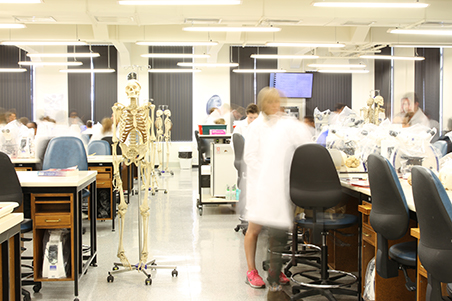 The Anatomical Sciences Education Research Team (ASERT) studies best practice in anatomy teaching and learning - examining how we teach the health sciences, and understand our anatomy. The Department of Anatomy prides itself on its teaching, and members of ASERT aim to inform our teaching practice by conducting research into teaching methods and student outcomes. Members of ASERT are interested in how we communicate anatomical knowledge, and creating practical solutions to common teaching difficulties. ASERT works closely with students to understand their needs and knowledge uptake – improving our teaching and helping them to achieve their learning goals.
The Anatomical Sciences Education Research Team (ASERT) studies best practice in anatomy teaching and learning - examining how we teach the health sciences, and understand our anatomy. The Department of Anatomy prides itself on its teaching, and members of ASERT aim to inform our teaching practice by conducting research into teaching methods and student outcomes. Members of ASERT are interested in how we communicate anatomical knowledge, and creating practical solutions to common teaching difficulties. ASERT works closely with students to understand their needs and knowledge uptake – improving our teaching and helping them to achieve their learning goals.
ASERT members are involved in a range of research projects which span multiple areas of teaching in the anatomical and health sciences.
Associated Researchers
Affiliate Researchers
Associated Postgraduate Students
Dr. Louisa Baillie
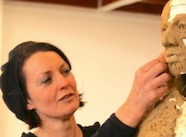 Louisa works as an artistic anatomist for the Anatomy Museum collection. As well as helping maintain the existing models, Louisa engages with teaching staff to develop new models that aid effective learning for today's students. For these, she can use a range of technologies including digitally scanning objects to print in 3D plastic, and silicone cast models that imitate soft tissue feel and look. These objects encourage kinetic and touch sensory learning, and also intend to facilitate students' 3D understanding of anatomy.
Louisa works as an artistic anatomist for the Anatomy Museum collection. As well as helping maintain the existing models, Louisa engages with teaching staff to develop new models that aid effective learning for today's students. For these, she can use a range of technologies including digitally scanning objects to print in 3D plastic, and silicone cast models that imitate soft tissue feel and look. These objects encourage kinetic and touch sensory learning, and also intend to facilitate students' 3D understanding of anatomy.
Dr. Rebecca Bird
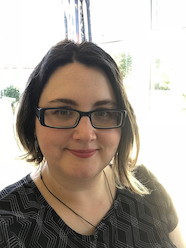 Rebecca teaches into First Year Health Science and second-year Anatomy papers. Her research focuses on student experience and success. In particular she is interested in understanding how students learn and retain information, how to support at-risk students, and how students transition into different levels of study. Current projects with other ASERT members include focus on how students learn reproductive biology, and also exploring links between attendance, motivation and learning. Rebecca is currently on part-time secondment (0.4FTE) to the Office of Student Success where she is a Research Fellow/Research Leader.
Rebecca teaches into First Year Health Science and second-year Anatomy papers. Her research focuses on student experience and success. In particular she is interested in understanding how students learn and retain information, how to support at-risk students, and how students transition into different levels of study. Current projects with other ASERT members include focus on how students learn reproductive biology, and also exploring links between attendance, motivation and learning. Rebecca is currently on part-time secondment (0.4FTE) to the Office of Student Success where she is a Research Fellow/Research Leader.
Dr. Natasha Flack
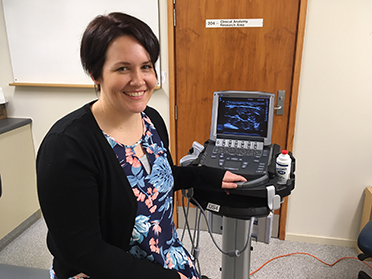 Natasha's research includes both clinical anatomy and anatomical sciences education. In her education research Natasha is focused on student's perceptions of learning anatomy and in particular the role that using cadaveric tissue plays in the success of learning anatomy. Natasha is currently involved in studies that look at Science students' perceptions of using cadaveric tissue, and what support systems are in place, and/or are needed to ensure the success of their learning. Along with other members of the ASERT Natasha is interested in the link between motivation, attendance and learning, and identifying particular threshold concepts that may be associated with learning advanced anatomical knowledge.
Natasha's research includes both clinical anatomy and anatomical sciences education. In her education research Natasha is focused on student's perceptions of learning anatomy and in particular the role that using cadaveric tissue plays in the success of learning anatomy. Natasha is currently involved in studies that look at Science students' perceptions of using cadaveric tissue, and what support systems are in place, and/or are needed to ensure the success of their learning. Along with other members of the ASERT Natasha is interested in the link between motivation, attendance and learning, and identifying particular threshold concepts that may be associated with learning advanced anatomical knowledge.
Associate Professor Jane Girling
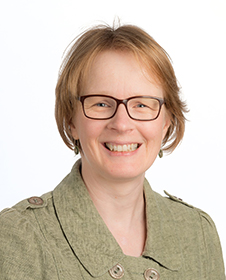 Jane is a reproductive biologist with particular interests in uterine biology, menstrual health and endometriosis. In addition to her laboratory-based research, she is also interested in knowledge and education in reproductive health and wellbeing. She is part of the 'Learning Repro' research team, as well as the team exploring menstrual health and endometriosis education here in Aotearoa New Zealand. Jane teaches reproductive biology into the first year Health Sciences and 2nd, 3rd and 4th year Anatomy papers.
Jane is a reproductive biologist with particular interests in uterine biology, menstrual health and endometriosis. In addition to her laboratory-based research, she is also interested in knowledge and education in reproductive health and wellbeing. She is part of the 'Learning Repro' research team, as well as the team exploring menstrual health and endometriosis education here in Aotearoa New Zealand. Jane teaches reproductive biology into the first year Health Sciences and 2nd, 3rd and 4th year Anatomy papers.
Professor Siân Halcrow
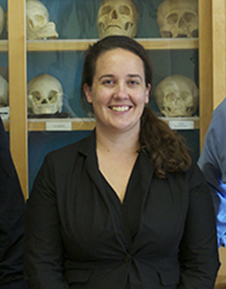 Siân is a bioarchaeologist with research expertise in Southeast Asian prehistory, ethics of bioarchaeological practice, and anatomy museum studies. She teaches in a range of classes in Biological Anthropology and Anatomy. Sian has an active research programme with students that investigates the place of historical human remains in education in the Anatomy Museum.
Siân is a bioarchaeologist with research expertise in Southeast Asian prehistory, ethics of bioarchaeological practice, and anatomy museum studies. She teaches in a range of classes in Biological Anthropology and Anatomy. Sian has an active research programme with students that investigates the place of historical human remains in education in the Anatomy Museum.
Professor Christine Jasoni
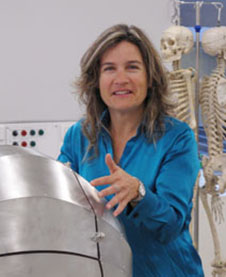 The overarching goal of Christine's lab is to understand how complications of pregnancy - such as obesity, gestational diabetes, and infection - increase the risk that offspring will acquire neurodevelopmental abnormalities later in life – such as autism spectrum disorder, obesity, learning disabilities, and depression.
The overarching goal of Christine's lab is to understand how complications of pregnancy - such as obesity, gestational diabetes, and infection - increase the risk that offspring will acquire neurodevelopmental abnormalities later in life – such as autism spectrum disorder, obesity, learning disabilities, and depression.
Christine is has also conducted research aimed at discovering the factors that are important for a smooth, engaged, and successful transition into University science and postgraduate study.
Dr. Charlotte King
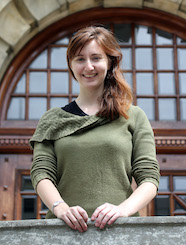 Charlotte is a lecturer in the Department of Anatomy and teaches into first year Health Sciences, Biological Anthropology and Forensics papers. She is interested in how students and the public take biological evidence from the human skeleton, and translate that into understanding of people's lives. She is involved in/developing projects looking at skeletal biology, identity and empathy in collaboration with colleagues from the Department of Science Communication.
Charlotte is a lecturer in the Department of Anatomy and teaches into first year Health Sciences, Biological Anthropology and Forensics papers. She is interested in how students and the public take biological evidence from the human skeleton, and translate that into understanding of people's lives. She is involved in/developing projects looking at skeletal biology, identity and empathy in collaboration with colleagues from the Department of Science Communication.
Jeremy McCallum-Loudeac
Jeremy is a new Teaching Fellow in the department of Anatomy teaching into first, second and third year anatomy papers- primarily involved in facilitating labs and tutorials. His PhD research (Developmental biology), looks at the genetics of adolescent idiopathic scoliosis (spinal curvature) and how genetic variants found in the population might contribute to incorrect spinal cord development, negatively impacting function and resulting in spinal curvature. He also has a keen interest in reproductive biology and breaking down the stigmas/prejudices with learning reproductive biology, particularly with learning reproductive biology of the opposite sex.
Tim McLennan
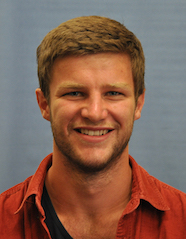 Tim is a Teaching Fellow in the Department of Anatomy. Tim's education research focuses on the support of at-risk students through in-person tutorials and online resources. Additionally, Tim is undertaking a Postgraduate Diploma in Higher Education, where he is investigating the perceptions of Teaching Only Academics in the Division of Health Sciences at Otago University. Finally, Tim is working alongside other ASERT members to examine the links between attendance, motivation, and learning.
Tim is a Teaching Fellow in the Department of Anatomy. Tim's education research focuses on the support of at-risk students through in-person tutorials and online resources. Additionally, Tim is undertaking a Postgraduate Diploma in Higher Education, where he is investigating the perceptions of Teaching Only Academics in the Division of Health Sciences at Otago University. Finally, Tim is working alongside other ASERT members to examine the links between attendance, motivation, and learning.
Professor Helen Nicholson
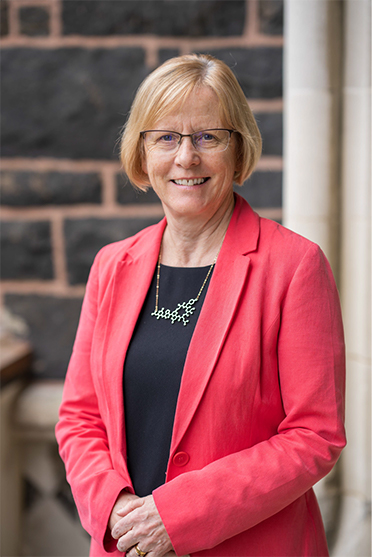 Helen is a Professor in Anatomy and also the Deputy Vice Chancellor Academic. Her research interests include clinical anatomy and medical/anatomy education. In the field of education Helen's work has involved working with Dr Paul Trotman on two documentaries: Donated to Science and Practising Medicine which have led to studies of how students learn anatomy and clinical skills. She is currently working with Dr Smith-Han to explore issues of professional identity and well being of health professionals during the covid pandemic.
Helen is a Professor in Anatomy and also the Deputy Vice Chancellor Academic. Her research interests include clinical anatomy and medical/anatomy education. In the field of education Helen's work has involved working with Dr Paul Trotman on two documentaries: Donated to Science and Practising Medicine which have led to studies of how students learn anatomy and clinical skills. She is currently working with Dr Smith-Han to explore issues of professional identity and well being of health professionals during the covid pandemic.
Dr. Latika Samalia
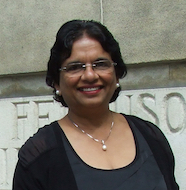 Latika joined the Department of Anatomy in 1993 after having 15 years of being a clinician in Obstetrics and gynaecology. After having had a busy clinical career, for a change of lifestyle, she joined the Department of Anatomy and has since taught in all Professional undergraduate and postgraduate courses, including FRACS and Postgraduate Diploma in Surgery. She has delivered lectures to large groups of 1st year Health Sciences with 2000 students to small postgraduate surgical groups of 26 doctors.
Latika joined the Department of Anatomy in 1993 after having 15 years of being a clinician in Obstetrics and gynaecology. After having had a busy clinical career, for a change of lifestyle, she joined the Department of Anatomy and has since taught in all Professional undergraduate and postgraduate courses, including FRACS and Postgraduate Diploma in Surgery. She has delivered lectures to large groups of 1st year Health Sciences with 2000 students to small postgraduate surgical groups of 26 doctors.
She has introduced Ultrasound teaching for medical classes. Her teaching interests are in clinical anatomy of the pelvis but she lectures in all the body systems.
Latika currently teaches 2nd, 3rd and 5th year medicine, 2nd year Physiotherapy and dental students. She has been responsible for introducing a number of anatomy postgraduate clinical workshops in the department. Apart from her busy teaching commitment she is involved with other members of ASERT in reproductive biology research.
Dr. Kelby Smith-Han
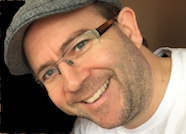 Kelby is a Lecturer and Co-Convenor for the Early Professional Experience (EPE) vertical module, in the Early Learning in Medicine (ELM) programme at Otago Medical School and is a Research Fellow in the Department of Anatomy in health professional education research. Kelby's research interests covers student learning development, student experience, and academic staff development. His student learning development research specifically includes professional identity development, transformational learning, professionalism, medical humanities, threshold concepts, clinical experience of medical students and learning in working environments. Research on student experience focuses on the health and wellbeing of medical students. His academic staff development research currently centres on the professional development of educators in metacognition strategies to use in their teaching. Kelby uses qualitative, quantitative and mixed methods approaches in his research.
Kelby is a Lecturer and Co-Convenor for the Early Professional Experience (EPE) vertical module, in the Early Learning in Medicine (ELM) programme at Otago Medical School and is a Research Fellow in the Department of Anatomy in health professional education research. Kelby's research interests covers student learning development, student experience, and academic staff development. His student learning development research specifically includes professional identity development, transformational learning, professionalism, medical humanities, threshold concepts, clinical experience of medical students and learning in working environments. Research on student experience focuses on the health and wellbeing of medical students. His academic staff development research currently centres on the professional development of educators in metacognition strategies to use in their teaching. Kelby uses qualitative, quantitative and mixed methods approaches in his research.
Dr. Kanchana Subasinghe
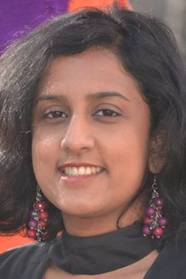 Kanchana is a professional practice fellow who joined the Department of Anatomy in 2020. After practising as a medical doctor for a few years, she decided to change her career pathway into being an academic. Since then, she has been teaching Clinical Anatomy for all the professional undergraduate (2nd year, 3rd year and 5th-year Medical & dental) and postgraduate courses in the Department of Anatomy, including Postgraduate Diploma of Surgical Anatomy and FRACS. Kanchana is looking forward to extending her research in the field of clinical anatomy and educational research.
Kanchana is a professional practice fellow who joined the Department of Anatomy in 2020. After practising as a medical doctor for a few years, she decided to change her career pathway into being an academic. Since then, she has been teaching Clinical Anatomy for all the professional undergraduate (2nd year, 3rd year and 5th-year Medical & dental) and postgraduate courses in the Department of Anatomy, including Postgraduate Diploma of Surgical Anatomy and FRACS. Kanchana is looking forward to extending her research in the field of clinical anatomy and educational research.
Joanna Tomlinson
Joanna's research encompasses both clinical anatomy and education. She is currently a PhD Candidate in the Clinical Anatomy group researching the hip joint innervation. Within the field of pedagogy, she is particularly interested in the following themes of research: removing barriers to education, supporting at-risk students, spatial comprehension, and peer tutor development.
Her teaching career began in the UK, where she was heavily involved in teaching into many healthcare, science, and postgraduate programmes, alongside working as a Prosector and completing her Postgraduate Certificate in Healthcare and Biomedical Sciences Education. She maintains her keen interest in pedagogy through teaching forensic science and anatomy students, as well as undertaking research with other members of the ASERT group looking into student's understanding of reproductive biology, menstrual health education and methods to support tutors in their teaching.